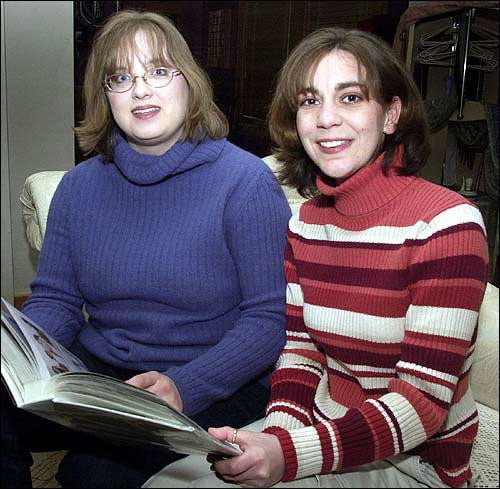Kansas ponders saying ‘I don’t’ to gay marriage
Topeka ? On her big day five years ago, Tiffany Muller wore an off-white dress. Before 150 relatives and friends at a Johnson County banquet hall, she and her beloved spoke vows they had written themselves, exchanged rings and cut a cake.
Despite the ceremony that united them, however, Muller and Erin Norris have no marriage license. That is because both are women.
Now, the idea that couples such as Muller and Norris could someday marry legally has Kansas legislators considering a proposed amendment to the state Constitution reinforcing the state’s long-standing policy against recognizing same-sex marriage.
Kansas lawmakers are not alone. In at least 13 other states where gay marriage is prohibited by statute, proposals are pending to enshrine the ban in state constitutions.
Muller believes she should be allowed to marry legally, just as a heterosexual woman would. Marriage not only confers certain legal benefits but would be important for larger, symbolic reasons, she said in an interview.
“In a way, it’s society saying, basically, ‘Yes, we will recognize you as a couple,”‘ Muller said. “Basically, I feel I’m just as worthwhile as anybody else — and my relationship is just as worthwhile.”
But legislative resistance has been evident even in Massachusetts, where the highest state court struck down a law banning same-sex marriage in November and has now ruled that gays and lesbians must be given the right to marry under the state constitution.
The constitutions of four states — Alaska, Hawaii, Nebraska and Nevada — already have provisions against same-sex marriages.
In 34 states, including Kansas, legislatures in recent years have approved “defense of marriage” laws emphasizing long-standing policies that recognize marriage only between a man and a woman.
Still, legislators in some states believe their “defense of marriage” laws could be vulnerable in court, said Matthew Staver, president and general counsel for the Liberty Counsel, an Orlando, Fla.-based group that describes itself as representing traditional family values.

Tiffany Muller, right, and Erin Norris hold their wedding album at home in Topeka. The idea that Muller and Norris, or other same-sex couples could marry legally someday has legislators considering a proposed constitutional amendment to reinforce Kansas' long-standing policy against recognizing such unions.
Staver said the Massachusetts court decisions “ultimately increased the groundswell of support for traditional marriage.”
A hearing on Kansas’ proposed constitutional amendment is scheduled Wednesday before the House Committee on Federal and State Affairs. Chairman Bill Mason, R-El Dorado, supports the measure and predicts it will easily win adoption.
“Kansas is a pretty conservative, family-oriented state, with strong family values,” Mason said.
The proposed amendment, stating that marriage “shall be constituted by one man and one woman only,” would go before Kansas voters if two-thirds of both the House and Senate agreed. The proposal does not specify whether the proposal would go on the ballot for the Aug. 3 primary or the Nov. 2 general election.
The issue is hardly partisan.
House Minority Leader Dennis McKinney called same-sex marriages the “major social issue of the year.”
“There are a lot of strong feelings out there for it,” McKinney, D-Greensburg, said recently. “I’ll probably vote for it.”
Other states considering proposed constitutional changes include Arizona, Georgia, Idaho, Illinois, Indiana, Kentucky, Michigan, Minnesota, Missouri, Oklahoma, Utah, Vermont, Wisconsin. Staver said he expects proposals in Alabama, Florida and Texas as well.
Staver contends that states should recognized only traditional marriages, arguing that heterosexual unions remain the best for rearing children.
“It really comes down to societal values and preserving the family and protecting children,” Staver said. “It’s based upon a millennium of human history.”
Rep. Jan Pauls, D-Hutchinson, who wrote the 1996 Kansas law against same-sex marriages and is a primary backer of the proposed constitutional amendment, said this year’s measure would prevent the courts from going against public sentiment on same-sex marriage.
“We believe our laws should reflect what the citizens of Kansas believe, and that is that marriage should be between two people of the opposite sex,” she said.
Not all Kansas legislators are sure an amendment should be pursued.
Senate Judiciary Committee Chairman John Vratil, R-Leawood, said the Kansas Constitution is supposed to “state broad principles under which we live as a society” and not legislate on current political topics.
Gov. Kathleen Sebelius said Friday she was “baffled” by the proposed amendment because Kansas law already is so clear.
“I’d like to folks to concentrate on issues that we really need to deal with,” Sebelius said at a news conference. “I think this has been adequately dealt with.”
Meanwhile, at least a few gay and lesbian couples continue to have marriage-like ceremonies.
The Rev. Paul Evans, pastor of Topeka Metropolitan Church, said he performs six to 10 holy union ceremonies a year, complete with vows, music, Scripture readings and, often, an exchange of rings.
In Lawrence, the Rev. Lewis Hinshaw, associate pastor at the Plymouth Congregational Church, is helping a same-sex couple plan an offsite ceremony for June. He said his attitudes about such ceremonies have changed in his 21-year ministerial career, as he came to know more gay couples.
Muller and Norris have both a photo album and a video of their 1999 ceremony.
“In a lot of ways, it was fairly traditional,” Muller said. “The untraditional part of it was that we wrote most of the ceremony ourselves.”







